
|
Deaths Scenes 1960-1961 |
| Film Title/Year and Description | ||||||||||||||||||||

|
Afraid to Die (1960, Jp.) (aka Karakkaze Yarô) Director Yasuzô Masumura's garish, off-beat, yakuza crime drama told a story of a man's inability to escape from his criminal underworld past in the real-world. Black leather-clad, ex-con yakuza gang leader Takeo Asahina (Yukio Mishima), once released from prison, attempted to give up his former life - including his leadership of a yakuza gang, and his relationship with nightclub singer-girlfriend Masako Katori (Yoshie Mizutani). Most importantly, he failed to follow the stern, prophetic advice of his elderly, white-haired, old-style tattooed yakuza uncle Gohei Hirayama (Takashi Shimura) to go after his rival yakuza boss Yusaku Sagara (Jun Negami). After slapping his nephew, Gohei tossed him a gun and urged:
The impressive ending scene was of the hero's noble but doomed death - after raping and impregnating theater cashier Yoshie Koizumi (Ayako Wakao), the father-to-be was purchasing "special" baby clothes in a crowded marketplace for his expected baby. Asthmatic hit-man Masa (Shigeru Kôyama) from Hokkaido, hired by Sagara, came up behind him and stuck a gun in his back. Asahina spoke his final words:
He was shot and lethally wounded, and then stumbled and fell onto a moving up-escalator - metaphorically, he struggled to climb downwards, but eventually collapsed and was transported upwards to the top of the stairway, with the gift still clutched in his right hand. |
     
|
||||||||||||||||||

|
Black Sunday (1960, It.) (aka La Maschera Del Demonio, or The Mask of Satan, or The Mask of the Demon) In the prologue of this Italian gothic horror film by Mario Bava, 17th century condemned witch Princess Asa Vajda (Barbara Steele) was first branded by her Grand Inquisition executioners with an S (The Mark of Satan). Then, an iron 'mask of steel' (lined with spikes on the inside) was hammered with a large wooden mallet onto her face - causing blood-splattering and gushing blood through the eyeholes. |
   Mask Hammered Onto Face |
||||||||||||||||||
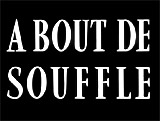
|
Breathless (1960, Fr.) (aka A Bout de Souffle) The ending, shot with a hand-held camera, showed a surprised fugitive Michel Poiccard (Jean-Paul Belmondo) gunned down by the police after his radiantly-beautiful partner - short-haired American student Patricia Franchini (Jean Seberg) - betrayed him to the authorities. As Michel was shot and wounded and ran down a Parisian street, Patricia followed after him, until he collapsed from lethal wounds. There were various translations of the final four lines of dialogue, between Michel, Patricia, and Police Inspector Vital (Daniel Boulanger):
She stared directly at the camera and responded by imitating Michel, asking impassively: "What's that mean, puke?", as she ran her thumb across her upper lip (from right to left and around her lower lip). She then abruptly turned around, to end the film. |
  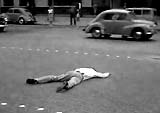  Fugitive Michel Gunned Down |
||||||||||||||||||

|
The Housemaid (1960, S. Korea) (aka Hanyeo) Writer/director Ki-young Kim's psychological horror thriller and domestic melodrama set in post-war Korea, included themes of marital infidelity and the predatory sexual obsession of the title character - the deranged 'housemaid', mixed with a critique of traditional and materialistic bourgeois values. During a pre-credits sequence, a husband was speaking to his wife while reading a newspaper account about a businessman who committed adultery with a housemaid and brought terrible consequences upon his family. It was a clue to the film's framing device (with a surprise ending) and a premonition of what would happen in the film:
The opening title credits (with dripping blood in B/W) were superimposed above the unsettling and long game of cat's cradle metaphorically played by the couple's two children. The main characters who lived in a claustrophobic, two story western-style, South Korean house - a family of four, included:
The family hired an unstable, pig-tailed, chain-smoking, "not too bright" textile factory worker Myung-sook (Lee Un-shim) as the housemaid, who began behaving unpredictably, erratically, capriciously and strangely -- almost immediately, she chased and caught a rodent with her bare hands in the kitchen and had an unusual smile on her face as she held up its corpse by the tail. She also developed an obsession with rat poison kept in the kitchen cupboard, voyeuristically spied on Kim giving piano lessons through a sliding glass door, taunted the children, and banged on the piano in the middle of the night. Pivotal deadly events soon occurred (many involving the structure's stairway) after the seductive Myung-sook forced herself on Mr. Kim in her bedroom, had sex, and she became pregnant. The housemaid tried to insinuate herself between Mr. Kim and his wife. The scheming Mrs. Kim learned of her husband's infidelity when he confessed to her, and she assured him:
Moments later, she suggested that the housemaid throw herself down the tall stairway to induce a miscarriage and abort the baby (and the incident was heard off-screen). Jealous of Mrs. Kim's newborn baby son, she also threatened to kill it. The same stairway caused the death of the younger son (he had been tricked by the vengeful housemaid into believing he had drunk from a glass of rat-poisoned water), and as he ran to tell his parents, he tripped and fell down the stairway and died at the foot of the stairs. The wife in desperation ("I only wanted to save my family from this living hell"), attempted to poison the housemaid, but the intended target had substituted sugar for the rat poison and became wise to the murder attempt. The housemaid terrified the daughter by stuffing her mouth with possibly-tainted rice. In the film's unforgettable climax (with a memorable death scene), the crazed housemaid urged Mr. Kim to commit a double-suicide with her by ingesting rat poison dissolved in glasses of water: ("That'll make the living happy - Die with me! Make me the happiest woman!"). As they were dying from the poison, she gave a deranged speech:
Mr. Kim decided to climb down the stairs to die by his wife's side: ("You can take my body, but not my soul"), but the housemaid resisted his last request: ("If I lose you now, I'll never find you again in heaven"). She grabbed onto his left leg and ankle and was dragged down each step - with her head pounding or thumping into each stair-step. If the poison didn't kill her, the damaging concussion did. When Mr. Kim crawled into his wife's sewing room and collapsed dead at her feet - she spoke regretfully: "Oh, if only I hadn't wanted the new house."
However, the previous series of deaths (caused by the stairs or rat poisoning) were only in the imaginations of the husband and wife. In the stunning and jarring plot twist ending, the camera pulled back to find both husband and wife alive. The scene returned to the opening pre-credits sequence, and the entire 'housemaid' story was seen to be a cautionary "what if" tale between the husband and wife:
However, suddenly, the sliding door opened, and the housemaid delivered a tray of tea to the family! and then the husband broke the fourth wall and addressed the camera and audience, before ending with a laugh:
|
 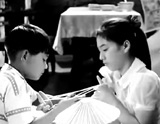      The Seduction The Deadly Stairway: 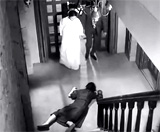 The Housemaid's Miscarriage  The Younger Son's Death at Foot of Stairs 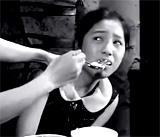 The Daughter's Force-Feeding  The Double-Suicide Poisoning  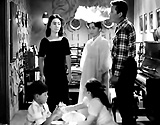  Plot-Twist Ending |
||||||||||||||||||
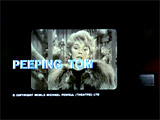
|
Peeping Tom (1960, UK) In this voyeuristic psychological thriller, there were many chilling murders committed by shy studio cameraman and serial killer Mark Lewis (Karl Boehm), seen through his cross-haired viewfinder (creating a POV shot). In the opening chilling scene, an eye suddenly opened. A photographer was stalking and filming a prostitute on a deserted nighttime London street with a concealed camera in his coat. She told him her price: "It'll be two quid." He then followed her to her upstairs apartment, where she began to undress. Then the killer revealed his hand-held camera, and the tripod with its spiked leg when it clicked open. His murder method was to film call girls and then stab them with the hidden knife. (The tripod also had a mirror attached so that the terrorized victims could watch themselves dying).
The photographer would then watch the projected grisly footage (and sound recordings) over and over in the darkness of his lab-studio. His viewing of this first death was accompanied by the film's opening title and credits. Due to an abusive childhood from his father, Mark had turned into a voyeur with a morbid fascination for capturing terror on the faces of female victims at the moment of death - an affliction termed scopophilia, the morbid urge to gaze. The much vilified film ended with Lewis' own suicidal death in the same horrific manner that he often used - as police arrived. He impaled himself in the neck with his own spiked device, as he spoke to spared female friend Helen Stephens (Anna Massey): "Helen, Helen, I'm afraid...And I'm glad I'm afraid, and then slumped dead to the floor. The words of a tape recording of his childhood made by his father ended the film:
|
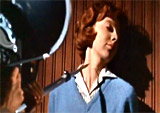 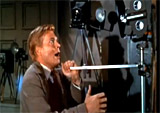 Self-Impalement With One's Own Murder Device |
||||||||||||||||||

|
The 45-second steamy shower slashing scene was beautifully edited - from 70 different angles with 90 edits. (See full description here)
Marion Crane (Janet Leigh) was butchered (although the blade of the knife only briefly touched her flesh) by Norman Bates/"Mother" (Anthony Perkins). |
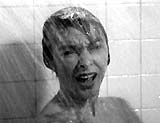 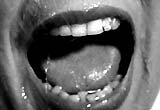
|
||||||||||||||||||

|
Detective Arbogast (Martin Balsam), after climbing to the top of the stairs, was slashed repeatedly when murdered with a gleaming knife wielded by Norman Bates/"Mother" (Anthony Perkins) (seen from a top-view), who emerged from a bedroom. In the striking death scene, the camera remained fixed on his face as he fell backwards down the full flight of stairs, and then was stabbed repeatedly with the upraised knife at the foot of the stairs.
|
  Attacked at Top of Stairs By 'Mother' |
||||||||||||||||||
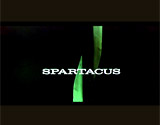
|
Spartacus (1960) In this dramatic historical epic, faithful follower Antoninus (Tony Curtis) and rebellious Spartacus (Kirk Douglas) fought a valiant, gladitorial sword-duel to the death (ordered by Crassus (Laurence Olivier)). Each attempted to save the other from a more painful death (the survivor would be crucified). The struggle concluded with Spartacus': "Forgive me, Antoninus" before he stabbed his friend. Antoninus delivered his last words:
Spartacus answered: "I love you, like my son that I'll never see. Go to sleep." In the last scene, Spartacus was crucified along the roadside with rows and rows of other rebels(and presumably suffered a slow and agonizing death). Crassus ordered: "I want no grave for him, no marker. His body's to be burned and his ashes scattered in secret," to prevent Spartacus from being a martyr. His wife Varinia (Jean Simmons) and child were at his feet as they left Rome, where the crucified were lined up along the road. In his last moments of life, Spartacus saw Varinia lift his son and heard her assuredly declare that the boy was now free and would never forget his father:
Forced to move along, she grasped his ankle for a few last words, begging him to die:
|
      "Goodbye, my love, my life." |
||||||||||||||||||
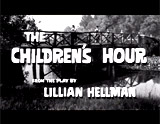
|
The Children's Hour (1961) This provocative film was a forward-looking story of female attraction between two headmistress-teachers at the Wright-Dobie School for Girls:
Self-loathing Martha broke down and confessed how 'guilty,' 'sick and dirty' she felt about her feelings toward Karen - and later committed suicide. She hanged herself in her room - her dangling feet were seen in shadowy silhouette. Her death was the result of her realization that the lesbian rumors about herself were true. |
 Dangling Feet - In Silhouette After Suicide |
||||||||||||||||||
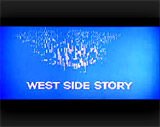
|
In the tense conclusion of this beloved musical, Maria (Natalie Wood) strove to reach ex-Jets gang member and lover Tony (Richard Beymer) before his fateful encounter with Chino (Jose De Vega). She rushed joyfully toward him to embrace him, but he had already been spotted by Chino. Just before they reached each other's arms in a tiny spot of light (and in the only area of dry pavement) on the playground, he was shot by Chino as revenge for Bernardo's (George Chakiris) death (and as retribution for being thwarted in his love for Maria). The remaining members of both gangs gathered after the single gunshot. Maria grieved as she held the dying Tony in her arms. She mourned his passing and commanded the two gangs that threatened more violence: "Stay back!" Walking in between them as she wielded Chino's deadly weapon, she accused all of them of being responsible for Tony's senseless death - contributing factors were societal intolerance, racial antagonism, misunderstanding, mistrust, and the fermentation of hatred. She lectured at them about how hate bred more hate:
She fell to her knees, weeping. A red light circulated over all of them from the approaching police car's cherry-top. She screamed at Lieutenant Schrank (Simon Oakland) as he walked toward her beloved's body: "Don't you touch him!" She tenderly kissed the lips of Tony one last time, and expressed her love for him in Spanish:
The struggle of Maria and Tony to love each other in the face of opposition ended on a hopeful note. The two gangs, confused, stunned, ashamed and sobered by the unnecessary triple killings, finally put aside their enmity. As some of the Jets struggled to bear Tony's body away, a few of the Sharks assisted them. Together, they solemnly carried him down the street, with Maria following. For once, the opposing groups were united and reconciled - by the heart-breaking tragedy. |
    Retribution Death Between NYC Gangs |
||||||||||||||||||
(chronological by film title) Intro | 1915-1929 | 1930-1933 | 1934-1938 | 1939 | 1940-1942 | 1943-1945 | 1946-1947 | 1948-1949 1950-1952 | 1953-1955 | 1956-1957 | 1958-1959 1960-1961 | 1962-1963 | 1964-1966 | 1967-1968 | 1969-1970 1971 | 1972 | 1973 | 1974 | 1975 | 1976 | 1977-1978 | 1979 1980 | 1981 | 1982 | 1983 | 1984 | 1985 | 1986 | 1987 | 1987 | 1988 | 1989 1990 | 1991 | 1992 | 1993 | 1994 | 1994 | 1995 | 1995 | 1996 | 1997 | 1998 | 1998 | 1999 2000-2001 | 2002 | 2003 | 2004 | 2005 | 2006 | 2007 | 2008 | 2009 | 2010 | 2011 |